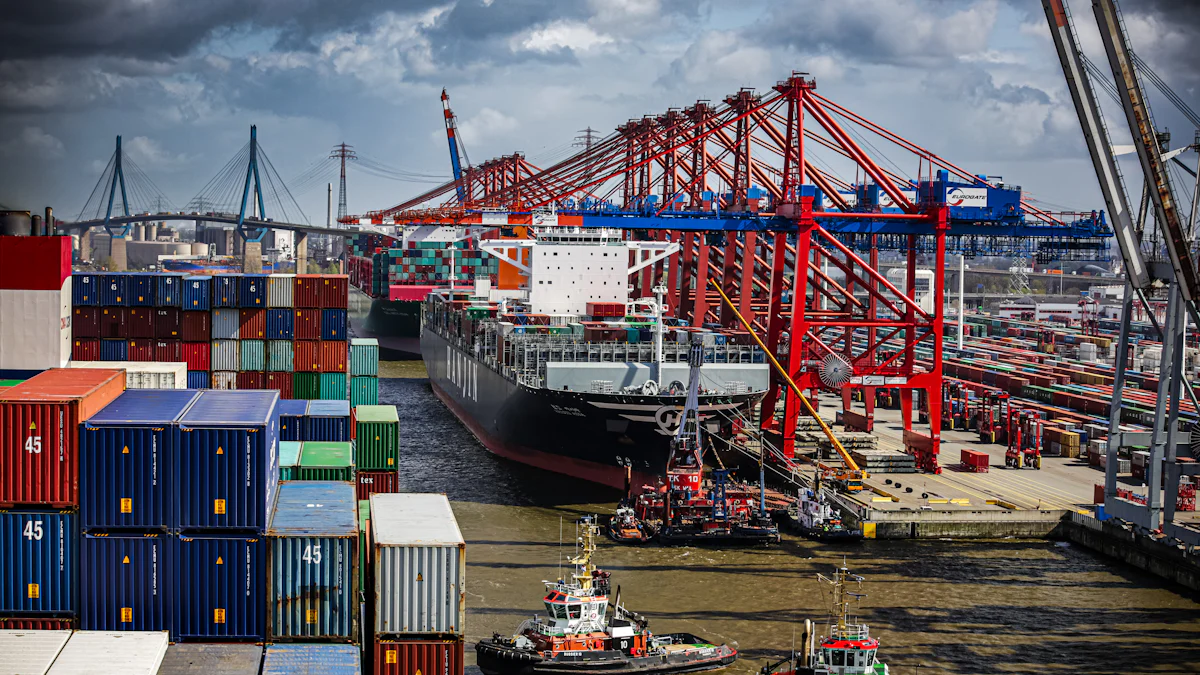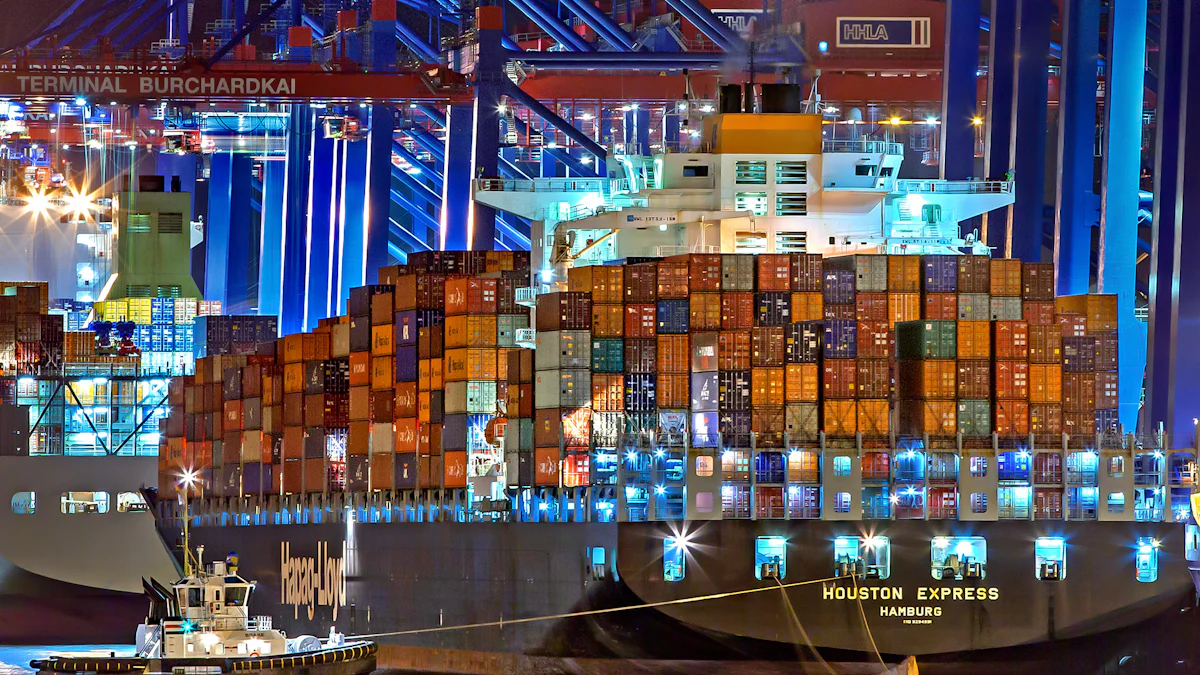Geopolitical Shifts and Their Consequences for Supply Chains

Geopolitical shifts are reshaping the global landscape, significantly influencing economies and trade. These changes have a profound impact on supply chains, which are the backbone of global commerce. Understanding these impacts is crucial for businesses navigating today's complex environment. Supply chains stretch across continents, linking diverse markets and industries. American innovation plays a vital role in adapting to these geopolitical shifts. Companies must also address climate risk, which adds another layer of complexity to supply chains. The need for resilience and adaptability in supply chains has never been more pressing. Embracing innovation and sustainability ensures businesses can thrive amid geopolitical challenges.
Understanding Geopolitical Events
Historical Context
Major geopolitical events in recent history
Geopolitical events have shaped the world in profound ways. The rise of an aggressive and revisionist China has caused significant shifts in power dynamics. Russia's invasion of Ukraine has also shaken the global community. These events have forced a reevaluation of supply chains. The COVID-19 pandemic created massive disruptions. Ports clogged, and freight forwarders scrambled to manage expensive cargo capacity. Emergency shipments became the norm. Trade conflicts between major economies have introduced new tariffs and restrictions. Businesses have struggled to source materials at reasonable costs. Geopolitical risks in business have become more pronounced.
Patterns and trends in geopolitical changes
Geopolitical risks posed by these events have led to noticeable patterns. Increased restrictions due to tensions between countries have disrupted trade flows. Supply chain problems have emerged even in third-party countries. Energy prices have fluctuated due to these disruptions. The global economy has felt the impact of these changes. Freight forwarders have faced bottlenecks and blockages. Rising costs have threatened the stability of global supply networks. Geopolitical events on strategic sourcing have become a critical focus for businesses. Companies have had to rethink their strategies. The emphasis on energy security has grown. Geopolitical risk management has become essential.
Current Geopolitical Landscape
Key players and regions
The current geopolitical landscape features key players like China and Russia. The United States remains a dominant force. The European Union plays a significant role. Regions like the Middle East hold strategic importance. Energy resources in these areas are crucial. Chinese economic policies influence global markets. Freight forwarders must navigate these complexities. The global economy relies on stable relationships among these players. Geopolitical events on strategic sourcing continue to evolve. Businesses must stay informed about these dynamics.
Emerging geopolitical tensions
Emerging tensions present new challenges. Hostilities in regions like China, Taiwan, and South Korea threaten supply chains. Even products assembled in the US and Europe face risks. Isolationism and trade restrictions have gained momentum. These trends exacerbate supply chain challenges. Freight forwarders must adapt to changing circumstances. The global economy remains vulnerable to these shifts. Events on strategic sourcing require constant attention. Climate factors add another layer of complexity. Businesses must prioritize resilience and adaptability.
Impact on Supply Chains

Disruption of Trade Routes
Examples of disrupted trade routes
Geopolitical Events often lead to disruptions in trade routes. The tension between China and other nations has caused significant shifts in shipping lanes. Businesses face challenges when traditional routes become inaccessible. The Renewing American Innovation Project highlights how these changes affect the Global Supply Chains. Freight forwarders must find alternative paths, which increases costs and delays.
Economic implications for businesses
Disruptions in trade routes have serious economic implications. Businesses experience increased shipping costs due to longer routes. Delays impact inventory levels and customer satisfaction. The Impact of Geopolitical Events forces companies to reassess their logistics strategies. The need for agility becomes crucial. Henrik from Global Procurement Marketing emphasizes the importance of proactive planning. Companies that adapt quickly can mitigate financial losses.
Changes in Trade Policies
Tariffs and trade agreements
Trade policies undergo frequent changes due to geopolitical tensions. Tariffs rise as countries impose restrictions on imports and exports. Analytics in Strategic Sourcing helps businesses navigate these complexities. Renewing American Innovation initiatives focus on adapting to new regulations. Companies must stay informed about policy changes to maintain competitiveness.
Regulatory challenges
Regulatory challenges arise as governments introduce new compliance requirements. Businesses face difficulties in meeting these standards. CSIS Renewing American studies show that companies must invest in compliance measures. Failure to comply results in fines and legal issues. The Evolving Risk Landscape requires constant vigilance. Companies must allocate resources to ensure adherence to regulations.
Supply Chain Disruptions
Strategies for supply chain resilience
Supply chain disruptions demand resilient strategies. Companies must diversify suppliers to reduce dependency on single sources. Renewing American Innovation encourages businesses to explore local sourcing options. Henrik advises firms to build strong relationships with multiple suppliers. Flexibility in procurement ensures continuity during crises.
Role of technology in risk management
Technology plays a vital role in managing risks. Data Analytics in Strategic sourcing provides insights into potential disruptions. Creon Butler advocates for the use of Cyber Attacks simulations to test supply chain resilience. Renewing American Innovation projects focus on integrating advanced technologies. Henrik from Global Procurement Marketing Henrik highlights the benefits of leveraging data for decision-making. Companies that embrace technology gain a competitive edge.
Strategies for Navigating Geopolitical Challenges
Diversification of Supply Sources
Benefits of diversifying suppliers
Diversifying suppliers offers numerous advantages for organizations. This strategy reduces dependency on a single source. Companies can mitigate risks associated with geopolitical tensions. Bremmer and Kupchan emphasize the importance of flexibility in supply chains. Businesses can maintain operations during disruptions by having multiple suppliers. This approach enhances resilience against unexpected events. Scanmarket highlights that diversification leads to competitive pricing. Organizations can negotiate better terms with various suppliers. This practice ensures a steady flow of goods, even amidst global uncertainties.
Case studies of successful diversification
Several companies have successfully diversified their supply sources. Bremmer and Kupchan point to firms that adapted during the Russia-Ukraine conflict. These organizations shifted their procurement strategies. They sourced materials from different regions, including the Middle East. This move helped them navigate turbulent waters. Scanmarket reports that businesses in the tech industry have diversified suppliers. These companies reduced reliance on China for critical components. This shift allowed them to efficiently navigate geopolitical events. The success stories demonstrate the power of strategic sourcing. Organizations can reshape global supply chains through diversification.
Strengthening Regional Partnerships
Importance of regional alliances
Regional alliances play a crucial role in navigating geopolitical risks. Strong partnerships enhance stability in supply chains. Bremmer and Kupchan stress the value of collaboration among neighboring countries. These alliances foster trust and cooperation. Organizations can benefit from shared resources and knowledge. Regional partnerships provide a buffer against global disruptions. Scanmarket notes that alliances improve access to local markets. Companies can expand their reach and customer base. This approach strengthens resilience against geopolitical challenges.
Examples of effective partnerships
Numerous examples highlight the effectiveness of regional partnerships. Bremmer and Kupchan cite the European Union as a model for collaboration. Member states work together to address common challenges. This unity benefits trade and economic growth. Scanmarket showcases partnerships in the Middle East. Countries in the region collaborate on energy projects. These alliances ensure a stable supply of resources. Organizations in the Global market can learn from these examples. Strong regional ties help navigate risks amidst global supply chain disruptions.
Investing in Technology and Innovation
Technological advancements in supply chain management
Technology plays a vital role in modern supply chain management. Innovations enhance efficiency and risk management. Bremmer and Kupchan highlight the use of data analytics in strategic sourcing. Companies leverage technology to predict potential disruptions. Scanmarket emphasizes the importance of automation in logistics. Automated systems streamline operations and reduce human error. Organizations gain a competitive edge through technological advancements. This investment improves decision-making and response times.
Future trends in supply chain technology
Future trends in supply chain technology promise exciting developments. Bremmer and Kupchan foresee increased use of artificial intelligence. AI will optimize inventory management and forecasting. Scanmarket predicts growth in blockchain applications. Blockchain ensures transparency and traceability in supply chains. These technologies will reshape global supply chains. Organizations must stay informed about emerging trends. Investing in innovation prepares businesses for future challenges. Companies can navigate geopolitical risks more effectively with advanced tools.
Geopolitical shifts have reshaped the landscape of supply chains. Businesses face challenges in navigating these changes. Proactive strategies become essential for maintaining resilience. Companies must invest in data collection and analysis. This approach enhances efficiency and adaptability. Supply chains benefit from diversified suppliers and strong relationships. Predictive analytics help manage risks effectively. The future of supply chains looks dynamic amidst global uncertainties. Organizations must prepare for long-term upheavals. Building resilience ensures continuity in operations. Embracing innovation and technology remains crucial. Companies can thrive by staying informed about geopolitical dynamics. Privacy policy and cookie policy considerations also play a role in strategic planning.
See Also
The Significance of Global Trade Supply Chain Importance
Addressing Globalized World Supply Chain Growth Hurdles
Understanding Inflation: Managing Supply Chain Interruptions
